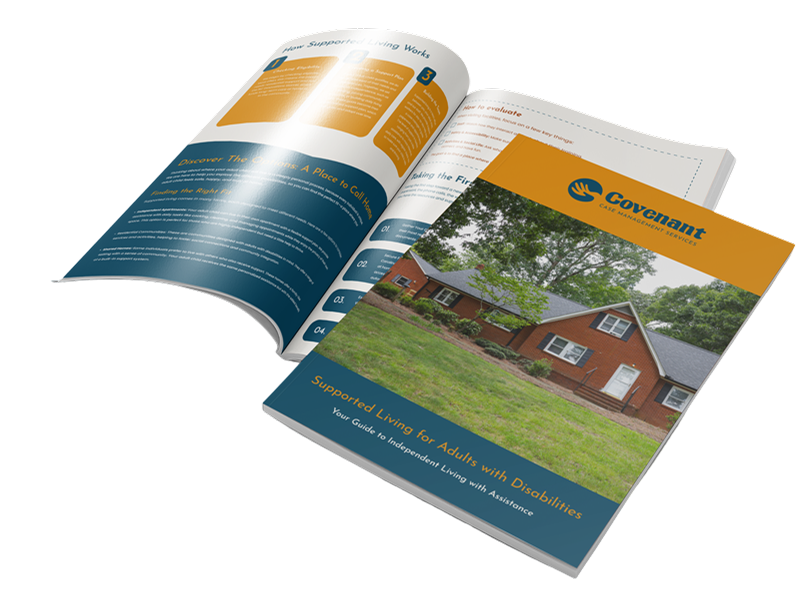
The Assisted Living Waiver Program: A Complete Guide
Covenant Team
Nov 4, 2025
Get the Guidance You Deserve, Right to Your Inbox
Whether you’re a caregiver, care professional, or individual seeking independence, We aim to keep you informed and inspired. Receive updates on services, events, and stories of hope by signing up to become a part of our email list below.
As a caregiver, you’ve spent years making sure your adult child’s needs are met, and it can be difficult to consider giving some of that control to others. When you look at future living arrangements, you’re searching for a service, but you’re also looking for peace of mind. Ultimately, you deserve support, too. The Assisted Living Waiver program is a way of securing a future where “what if” is no longer a question.
This article simplifies the program, breaking down all of its complexities. Then we’ll show you how to use the program to provide reliable long-term care support services so your adult child can thrive. You’ll learn the definition, services, eligibility, and the application process to get started.

What is the Assisted Living Waiver Program?
Let’s break it down. The Assisted Living Waiver program is a special part of Medicaid waiver program funding designed to offer long-term care support services. It’s a way for your adult child to get essential care while living at home or in the community, instead of in a facility like a nursing home. It’s called a waiver program because the program essentially “waives” some rules so they can cover services that regular Medicaid doesn’t.
The goal of this type of funding is to support greater independence and quality of life. In North Carolina, the main assisted living waiver program for individuals with IDD is the NC Innovations Waiver. This program helps with services needed to thrive in a community setting, such as daily help and skill-building.
If your adult child needs help managing their medication and learning to cook safely, the Innovations Waiver can pay for a trained professional to provide that one-on-one assistance in their home.
What the Program Offers
North Carolina’s Assisted Living Waiver program covers many essential services beyond health care. These services allow for true home and community-based services.
Let’s take a look at some of the core services available through this program:
- Personal Care and Mobility: Your adult child can receive help with bathing, dressing, and safely moving around their living space.
- Home and Life Skills: Assistance with tasks like cooking, cleaning, laundry, and learning how to manage money. This support ensures a safe and clean living environment.
- Health and Wellness: Support includes help with medication management and monitoring their health condition.
- Community Connections: Services like community networking encourage participation in local clubs, classes, and fun social and recreational activities.
- Time for You (Respite Care): The program offers respite care to give you a planned break from your caregiving duties, which is important for your own health.
- Transition Support: Transition care services help pay for things like rent deposits and furniture if your adult child moves from an institutional setting into their own home in the community.
- Transportation: Organized transport to essential medical appointments and other necessary destinations is included as part of the support.
- Individualized Service Plans (ISPs): This is a key component, creating a personalized plan detailing the specific services your adult child will receive.
This complete range of assistance allows your adult child to find success in their own home and community.
How To Find a Program in Your State
Finding the right assisted living waiver program in your state starts with knowing who to call. Since this type of funding is provided through Medicaid, you need to connect with the local office that handles these services.
For adults with IDD in North Carolina, the key organizations are the Local Management Entities/Managed Care Organizations. They manage the Innovations Waiver and other essential home and community-based services.
Steps to Find Your State’s Program
The hardest part is always the first step but it really only takes 4 steps to make this program work for you and it starts with a simple phone call.
- Contact your State Medicaid office (LME/MCO): Start by identifying the LME/MCO that serves your county, and call their Member Services line. You can also use the Centers for Medicare & Medicaid Services (CMS) website as a starting point to find state contact information.
- Search for Waiver Information: Ask specifically about the NC Innovations Waiver for adults with IDD. They will explain the process for the Registry of Unmet Needs (the waitlist) and other support options.
- Gather Documentation: To even be placed on the waitlist, you will need to provide documents like medical records and psychological evaluations to prove your adult child meets the eligibility for assisted living waiver programs.
Our Documentation Checklist:
- A recent psychological evaluation: This is the most important document. It must be from a licensed psychologist and typically needs to be recent (within the last 3-5 years). It must include standardized test scores for both IQ and adaptive behavior to confirm an I/DD diagnosis.
- Medical records: Any records that support the I/DD diagnosis or related conditions.
- School records (if applicable): The most recent Individualized Education Program (IEP) from their school can be very helpful in showing functional limitations.
- Legal papers (if applicable): If you have guardianship papers, include a copy.
- Submit the Application: The initial application, which places your adult child on the waitlist, involves emailing the completed forms and documents directly to your LME/MCO’s Registry team.
Important Considerations
It takes time to get on a program like this. That’s why it’s important to start the application for your adult child as soon as possible. It’s essentially a waitlist and slots are often given out based on the date of application.
While you wait
Ask your LME/MCO about 1915(i) services. This program can start you off with the basics like respite care and community living and support while your adult child is waiting for their application to go through. Then monitor the Innovations Waitlist Dashboard to see current county wait numbers.
What happens Next
Eligibility Requirements
Understanding the rules for the Assisted Living Waiver program is the last piece of the puzzle. Below are the four eligibility criteria to be met.
- Age Requirement
This waiver is for North Carolinians of all ages, children and adults alike. The disability must have started before your adult child turned 22.
- Medical Eligibility
Your adult child must have an intellectual or developmental disability or a related condition, like Autism or Down Syndrome.
- Care Level Requirement
Your adult child must require a lot of ongoing support, medically known as meeting the “ICF-IID level of care”. This means they need help with things like self-care, learning new skills, and safely living independently.
- Financial Assistance
The waiver looks only at your adult child’s income and assets, not yours. They must generally have less than $2,000 in countable assets and meet the low income limit for a single individual to qualify for Medicaid.
Your Path to Peace of Mind
The Assisted Living Waiver program is a powerful tool for securing life-changing long-term care support services for your adult child. By understanding the eligibility and application process, you can move forward with confidence. Let our team help you better understand and make the most of the Assisted Living Waiver program with Covenant Independence.
Download Your FREE Supported Living Guide!


